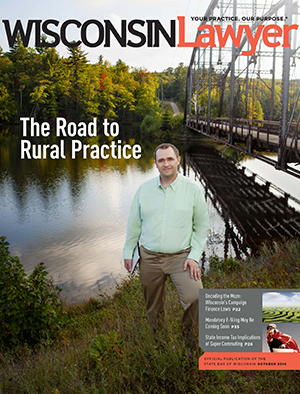 Oct. 3, 2014 – With a shortage of lawyers in some small towns, and some small town-lawyers nearing retirement, is it time to consider rural practice? The October Wisconsin Lawyer, now available online, explores the pros and cons of being a country lawyer.
Oct. 3, 2014 – With a shortage of lawyers in some small towns, and some small town-lawyers nearing retirement, is it time to consider rural practice? The October Wisconsin Lawyer, now available online, explores the pros and cons of being a country lawyer.
Writer Dianne Molvig, in “The Road to Rural Practice,” talks to a handful of attorneys and judges who describe rural practice, noting the small-town camaraderie, the unique legal issues, the beauty of rural Wisconsin, and the work-life balance, among other things.
“You actually are going to get to the courtroom to try cases,” says James Morrison, a circuit court judge in Marinette County. “You’ll gain the kind of experience almost all trial lawyers got 30 years ago that almost none of them get in the big cities anymore. …”
But not everyone wants to live among farm fields and forests. Attorneys in small-town practice sacrifice the metropolitan life, and younger attorneys don’t often want to do that. In addition, law school debt may prohibit some attorneys from taking that road.
While rural lawyers can make a good living, notes Lisa Brouillette in Menominee River, “working here will do little to dent school loan indebtedness.” Still, Molvig explores some potential programs for those who are motivated to take the road to rural practice.
In this feature article by administrative and regulatory attorneys Mike Wittenwyler and Jodi Jensen, of Godfrey & Kahn in Madison, both authors attempt to demystify the mystery that is campaign finance law, just as the election cycle rolls near.
Is the economy getting better for lawyers? Find out in this issue’s Briefly column.
They note that recent court decisions and other developments have affected Wisconsin’s campaign finance regulation system in various ways, and state legislation enacted this year “did not include the significant revisions necessary to ensure Wisconsin statutes comport with current case law and contemporary practices.”
“As a result, it remains understandably difficult to navigate Wisconsin’s campaign finance laws,” write the authors. “The impact of recent developments described [in the article] is intended to assist anyone attempting to work through the maze.”
In this article, former tax appeals commissioner and current Milwaukee County Circuit Court Judge Tom McAdams discusses the rapid growth of “super commuters,” and explains the multi-state tax implications of working in one state and living in another.
“Many of these taxpayers do not realize the tax complexity they will encounter when they work across state lines,” writes Judge McAdams. “The article will also touch on the related issues confronted by individuals who ‘work at home’ for an employer located in another state. A related but separate issue is income tax withholding.”
In a 101 column, attorneys learn the basic procedures for filing electronic documents in circuit courts in Wisconsin, which could be mandatory in the very near future.
Who enjoys a presentation of food that makes you hesitate to disturb what is served to you? Find out. Meet Our Contributors.
Jean Bousquet, chief information officer for the Wisconsin court system, and circuit court legal advisor Marcia Vandercook, take readers through a step-by-step filing process, noting that e-filing is both convenient and secure for all users.
And as Bousquet and Vandercook explain in “Mandatory E-filing May Be Coming Soon to the Courts Near You,” learning this system may soon be a requirement, under a proposal that is calling for e-filing to become mandatory in all 72 counties.
“Statewide e-filing systems have been implemented in 13 other states and are under active development in 27 more,” write the authors, noting the proposal by the Committee of Chief Judges, which will be presented to the Wisconsin Supreme Court. “The time has come for the Wisconsin circuit courts to move forward as well.”
Other Columns
In an Ethics column titled, “Communication Obligations Remain When a Lawyer Leaves a Firm,” State Bar Professional Ethics Committee Vice Chair Dean Dietrich considers the ethical rules when reviewing emails sent to a lawyer who has left the firm.
In a Managing Risk column, Tom Watson, of Wisconsin Lawyers Mutual Insurance Co., explains the importance of engagement letters in “Engagement Letters, Protection Numero Uno.” “The question isn’t whether your files should have an engagement letter,” he writes. “The question is what should go into this important document.”
Finally, in a playful Final Thought titled, “Parenthood and Law Practice Have a Lot in Common,” New Richmond attorney Deanne Koll compares the trials and tribulations of parenting to the challenges of law practice. “There are life lessons that ring true in both worlds,” she writes. “Here are a few that have helped me along the way.”
